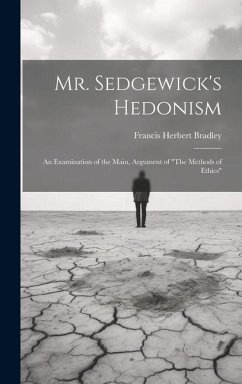
A Colloquy On The Utilitarian Theory Of Morals Presented In Mr. W.e.h. Lecky's History Of European Morals From Augustus To Charlemagne
Versandkostenfrei!
Versandfertig in über 4 Wochen
30,99 €
inkl. MwSt.
Weitere Ausgaben:

PAYBACK Punkte
15 °P sammeln!
"A Colloquy On The Utilitarian Theory Of Morals" examines and critiques the presentation of utilitarianism in W.E.H. Lecky's monumental "History of European Morals from Augustus to Charlemagne." Henry Bleckly delves into Lecky's interpretation of utilitarian ethics, offering a detailed analysis and engaging in a philosophical dialogue with the historian's perspective. This work provides valuable insights into 19th-century ethical debates and the reception of utilitarian thought within historical scholarship. It remains relevant for scholars interested in the history of moral philosophy, the de...
"A Colloquy On The Utilitarian Theory Of Morals" examines and critiques the presentation of utilitarianism in W.E.H. Lecky's monumental "History of European Morals from Augustus to Charlemagne." Henry Bleckly delves into Lecky's interpretation of utilitarian ethics, offering a detailed analysis and engaging in a philosophical dialogue with the historian's perspective. This work provides valuable insights into 19th-century ethical debates and the reception of utilitarian thought within historical scholarship. It remains relevant for scholars interested in the history of moral philosophy, the development of ethical theories, and the intellectual context of Victorian England. This title is a valuable addition to any collection focusing on moral philosophy and intellectual history. This work has been selected by scholars as being culturally important, and is part of the knowledge base of civilization as we know it. This work was reproduced from the original artifact, and remains as true to the original work as possible. Therefore, you will see the original copyright references, library stamps (as most of these works have been housed in our most important libraries around the world), and other notations in the work. This work is in the public domain in the United States of America, and possibly other nations. Within the United States, you may freely copy and distribute this work, as no entity (individual or corporate) has a copyright on the body of the work. As a reproduction of a historical artifact, this work may contain missing or blurred pages, poor pictures, errant marks, etc. Scholars believe, and we concur, that this work is important enough to be preserved, reproduced, and made generally available to the public. We appreciate your support of the preservation process, and thank you for being an important part of keeping this knowledge alive and relevant.












![An Essay Concerning Human Understanding. to Which Are Now Added, I. an Analysis of Mr. Locke's Doctrine of Ideas [&c., Incl. Some] Extr. From the Auth Cover An Essay Concerning Human Understanding. to Which Are Now Added, I. an Analysis of Mr. Locke's Doctrine of Ideas [&c., Incl. Some] Extr. From the Auth](https://bilder.buecher.de/produkte/68/68580/68580262n.jpg)